‘We the people’ is a timeless ideal of American democracy. What’s gone wrong?
A report from the Democracy Policy Lab at UC Berkeley finds Americans are confused about the meaning and practices of democracy and deeply distrustful of public institutions — and each other. Strong “democracy policy” could help renew national bonds, the authors say.
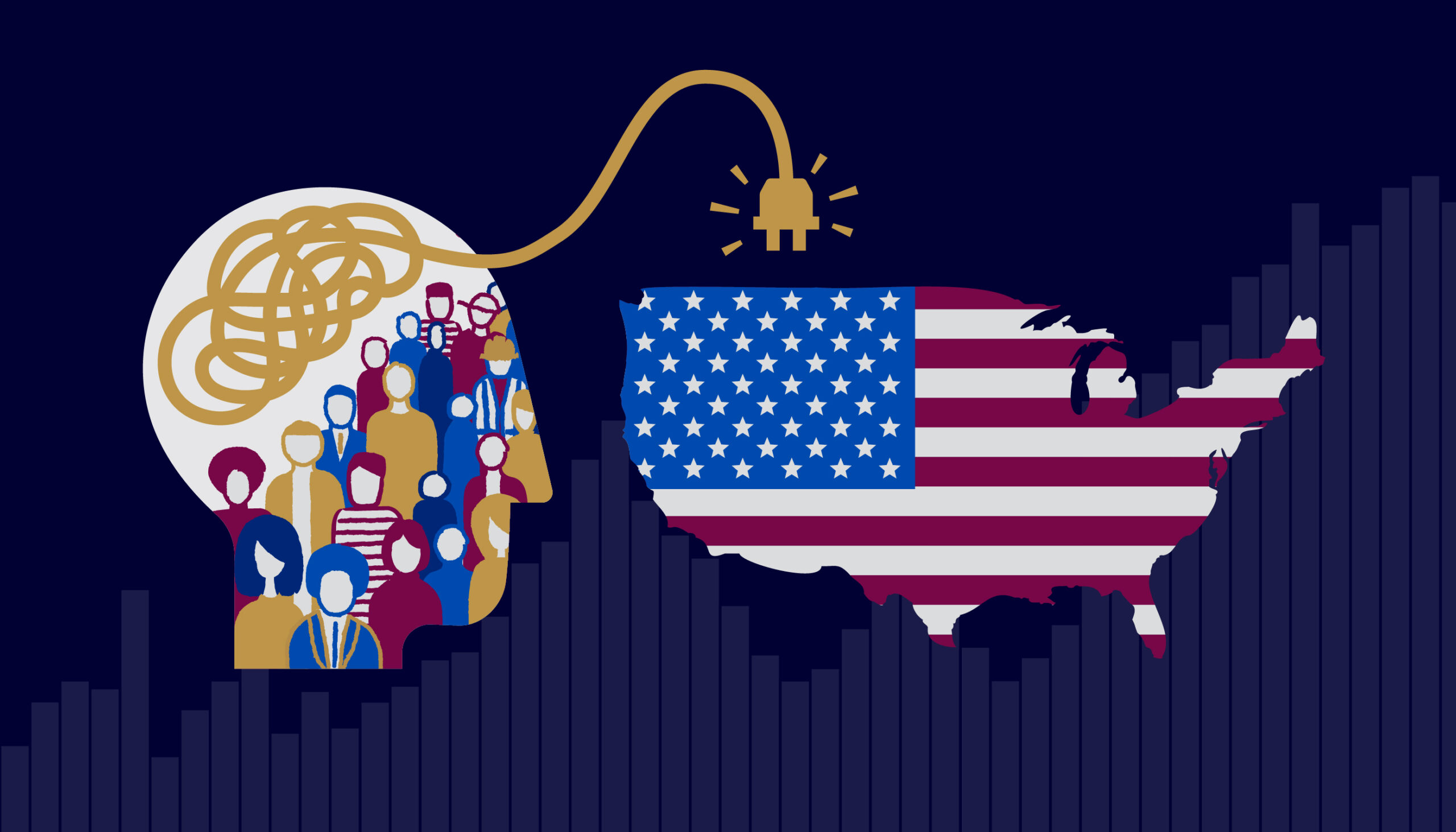
Illustration by Design Site
June 27, 2025
For a decade, scholars, pundits and other analysts have been searching deep in the American political experience to understand why democracy seems so stressed. Now a new UC Berkeley report based on extensive surveys finds that Americans are confused about the meaning of democracy and frustrated with the leaders and institutions responsible for guiding the country — but also open to hope for repair.
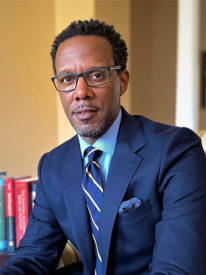
In an interview, lead author David C. Wilson detailed the findings of this plunge into our political psyche, surveying a tangle of concerning trends. Americans are struggling with epidemic mistrust, but they’re also eager for solutions. For democracy to flourish, the report finds, its people must be flourishing, too.
Wilson, a political psychologist, offered a potentially innovative course of therapy: Just as the nation has economic and health policy, local, state and federal leaders need a commitment to democracy policy to strengthen the system and nurture commitment to democratic values and practices.
Wilson is the dean of the Goldman School of Public Policy at Berkeley and a professor of public policy and political science. The report, “Delivering on the Promises of ‘We the People,’” is based on surveys of more than 2,400 Americans conducted before and after the November 2024 election.
The report was produced by the Goldman School’s Democracy Policy Lab.
Berkeley News: This paper, and the larger project, focus on the broad patterns and complexities of political psychology among Americans. Why is this important? What’s the study about, in a nutshell?
David C. Wilson: The basic premise is that in order for people to see the value and the faith and the nuance of democracy, they have to have a psychological connection with it. It’s just like any other relationship. If you can’t find a way to understand it and be connected with it, then it’s more difficult to care about its fate.
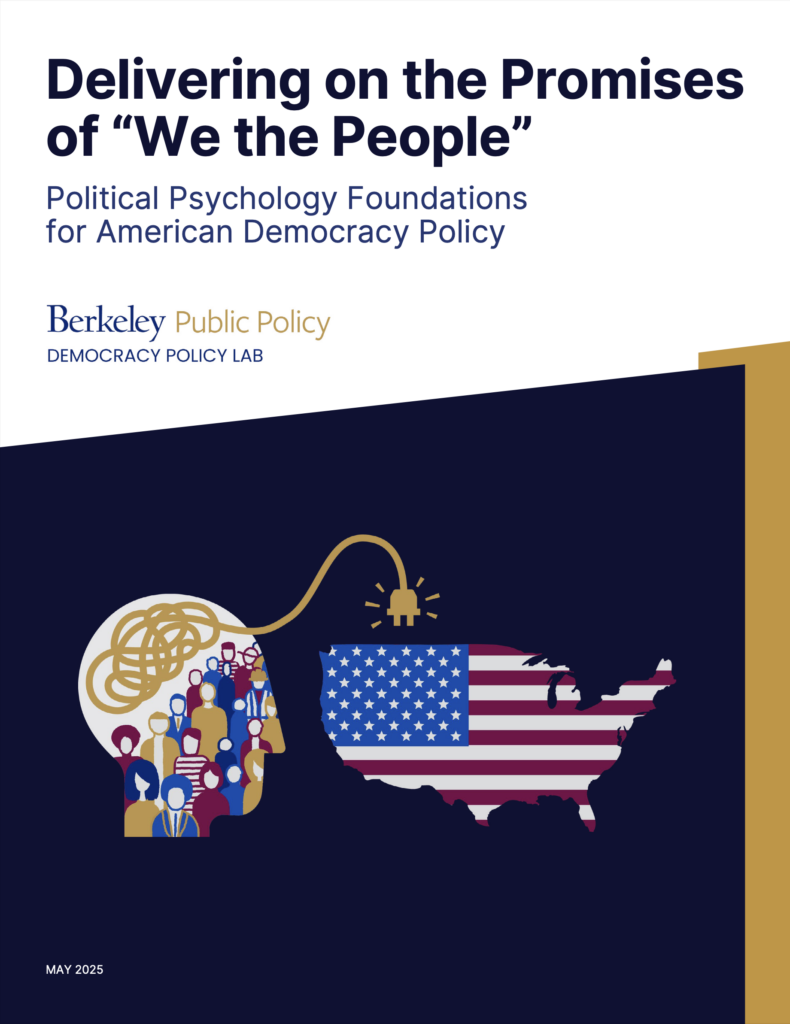
When people invest in their connection to democracy, it improves a sense of belonging, and willingness to see others are worthy of the rights and freedoms we cherish. If that doesn’t happen, it’s easier to feel like democracy is eroding.
There’s a really odd feature right now: Since Republicans won the last presidential election, they are the ones who have more faith in democracy and feel like America’s best days are ahead. This is because they believe their version of democracy is winning. If your team is winning, it strengthens your identity and connection with it.
Democrats have significantly less hope and optimism than Republicans, but they also have stronger grounding in values tied to a collective “we” and willingness to help others in need.
A central theme in the report is that the condition of democracy depends on the condition of the people — as you say, their sense of belonging, their sense of being served by the system. So a basic question: How are “we the people” doing?
Right now, people mostly pay attention to national government, which is mostly characterized by political parties, Democrats and Republicans. But that’s not democracy — that’s politics. This framing makes it more difficult for many to fully understand democracy. People mostly are confused about what democracy is and how it works, particularly at local, regional and state levels.
The American public is polarized not just around Democrats and Republicans, but … about who should benefit from the freedoms of American democracy.
We hear about the lack of trust in government and the lack of faith in democracy. Politicians run against government, and that disrupts people’s ability to see the value of democracy. That comes about because people are thinking about broader national politics, mostly.
Many of the other elements of democracy — jury duty, participation in civic assemblies, reading information about issues, service and sacrifice for broader goals — all of that gets ignored because of the focus on partisanship and presidential election politics. That has come to define our democracy in the minds of most people. But again, that’s politics.
When you ask about specific things that are going well with democracy — for example, do they trust local government to regulate clean water? Yes, they do, overwhelmingly. Do they support the federal government managing the cybersecurity infrastructure for the nation? Yes, they do. Do they support community organizations that partner with government to help set public health standards? Yes, they do, a lot. Do they see a value in jury duty? Overwhelmingly. And do they have an interest in learning more about democracy, especially how to improve it? Again, the answer is a resounding yes.
The report characterizes Americans as divided and confused about democracy. What does your research tell you?
Our polarization is not about democracy so much as it is about partisan and campaign politics and power, and appeals about threats of change eroding standards and values for the country.
When the country seems to believe, for example, that immigrants — them — are eroding the future of America through crime, and we ought to blame government for the problem, that becomes the lens by which people evaluate democracy. The contributions of immigrants and the role they play in strengthening the idea of America — us — gets lost.

David Goldman /
So the American public is polarized not just around Democrats and Republicans, but around how we should exist as a country, about who should benefit from the freedoms of American democracy. Should we allow special considerations to take place for women and minorities and other identities? What are the boundaries of freedom of expression and speech? Should protests be policed more strongly?
Today, if you speak out against the president, you may lose business with the federal government, or you might be on a blacklist of some type. Americans never thought that could happen in democracy. This is where I see confusion in the public. They may understand where they fall on a political issue, but don’t understand the implications for public governance and decision making: Executive overreach at the federal level can end your local private sector job.
Many never knew the president had that much power because presidents mostly followed the norm of forbearance and deference to traditional systems and culture. No one wanted to exert that power and be a king, but it was always available.
Another central point in the report: Polarization can be described as a lack of shared identity, a lack a shared sense of belonging. Does the report tell us anything about why that sense of a common bond isn’t there right now?
We all have what’s called a justice motive. We hold a general belief that people ought to get what they deserve and deserve what they get. And when you’re doing things that should yield a reward — you’re paying your taxes, your children going to school, you’re not committing any crimes — and yet your life is not getting better, the easy thing for one to do is to blame others.
If I see national news, Fox or CNN or whatever, or social media that’s extreme, I may come to believe that they are getting in the way of my good life. For example, one experiment from the study finds the public is more likely to say that economic assistance makes racial-ethnic minorities too dependent on public support than they are for military veterans, senior citizens or those in rural communities — all of whom could be racial-ethnic minorities. This suggests that communication appeals matter for polarization.
In fact, the public sees Democrats and Republicans governing in different ways. The data show that while people believe that Republicans tend to not help people like themselves, they believe that both the federal government and Democrats tend to help people that do not deserve it. Helping those who do not deserve help is seen as morally contemptible or unjust, whereas not helping an individual is more likely seen as a choice.
In essence, much of the polarization we see is grounded in resentment and beliefs about who deserves to get what in society.
The report seems to also say that diversity and racial resentment remain deep challenges. How is that impacting the health of U.S. democracy?
This is where the collective “we” in democracy needs our attention.
There’s not a lot of policy designed to bring groups together. It’s almost as if government leaders feel like that shouldn’t be their job.
If I’m a local or state leader and I see this problem that exists between two different communities — white and Black, immigrant and domestic, men and women, north side and south side — that’s a public problem. It’s no different than if I see land use problems or a health crisis in one area and not the other.
As a leader, I need to find a way to bridge the gap. But there’s not a lot of policy designed to bring groups together. It’s almost as if government leaders feel like that shouldn’t be their job.
But if we could design platforms and programs, and if government could find ways to bring disagreeing groups together around a common project or a common idea, that might reduce polarization.
Do you remember when a police officer in Massachusetts arrested Harvard Professor Henry Louis Gates as he was trying to get into his own home? That got huge national attention. And then President Obama called a “beer summit” and brought them both to the White House to talk.
That was diplomacy in a sense, but it was also democracy policy.
Good democracy is really not about what I’m getting in terms of a tax break or the benefits I’m getting because I’m poor or wealthy. It’s about the “we.” How can we design good ways of keeping domestic tranquility, keeping the collective “we” together, knowing that it won’t be perfect?
So we need more constructive dialogue to promote rapport and human flourishing.
Human flourishing — in the new report, that’s crucial to the psychology of American democracy. What constitutes flourishing and who’s flourishing in the United States right now? Who is not?
This idea of human flourishing comes from positive psychology — it’s a measure of well-being. And it is perhaps the most widely used as a measure of living a good life.
The good life is not only about how much money you have and how many material assets you have. It’s about a host of internal values and perceived capacity to contribute to society.
We use several items to measure human flourishing: Happiness and satisfaction. Meaning and purpose — are things that you’re doing in life worthwhile? Character and virtue, the idea that you always try and do good, even when it’s challenging. And then the last ones are about capacity: Do you worry about your monthly expenses? Do you worry about food, clothing, shelter, just having the basic things you need to live a good life?
If you’re high on all of those things, you’re characterized as flourishing. It doesn’t mean you’re wealthy or rich, but you’re in a position to live a good life.
How does all that tie into democracy?
Flourishing is not a fixed state of well-being. Before the election last fall, you found a lot of Democrats had positivity. They believed that things they do in their life were worthwhile. You had a lot of Republicans that had lower flourishing, that didn’t feel they would be able to meet their expenses and month-to-month and the like. After the election, all of a sudden, the Republicans had higher levels of flourishing, and the Democrats had lower levels.
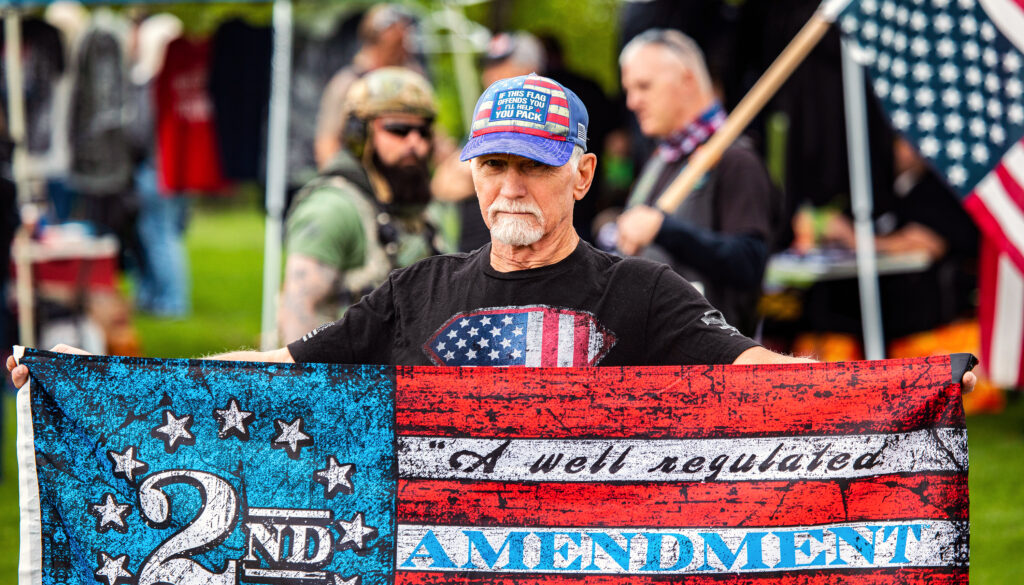
Gaspard Le Dem/Sipa via AP Images
Who’s flourishing in the country is highly correlated with how they’re experiencing democracy. Those who won in the last election, the Republicans, now have higher hope for democracy. Those who have higher flourishing also tend to have more negative racial attitudes, more negative gender attitudes, higher levels of right-wing authoritarianism, higher levels of gender resentment or hostile views toward women.
That seems odd. Why is it that the people who are actually in a position to live a good life are more antagonistic to other groups? The answer connects back to the justice motive we all tend to use to make judgements and decisions.
In America today, those who support the president’s vision of the country tend to also have fewer worries about their economic capacity and a greater sense of purpose, more happiness and the like. They have higher human flourishing, but to sustain that good life, they are motivated to believe their version of democracy and American society is the “right” direction.
They do not want to lose their psychological or political standing. It’s odd, but that fear of loss gives them purpose and meaning.
And yet the report says that some groups — women and younger people, for example — tend to be more on the side of not flourishing.
It depends on when you’re looking at flourishing. We didn’t see any gender or racial differences in terms of the levels of human flourishing across each individual wave of our survey. But in the very last wave, after the presidential inauguration, we found more women in the suffering category than in the flourishing category.
The consistent pattern that we did see is that people who are 30 or younger tended to fall in the suffering category more. They’re lower on both the internal values and the economic capacity than most other age groups. They’re having the biggest problem reconciling what democracy promises and what they’re seeing in reality.
They’re in a faster-paced world where they want to see change happen. They’re saying that they don’t have a connection with democracy, or it’s a weaker connection with democracy, and until democracy gets its stuff together, they’re going to push for change.
Democracy policy — policy that supports and strengthens democracy — is a core idea in this report. You’re saying that if there’s economic policy, or education policy, there also should be democracy policy.
Democracy policy is a framework where you have to think about: How do you encourage people caring about the system and one another? How do you keep them engaged in service and sacrifice for the collective good? How do you bolster tolerance for free speech and protest and religious freedoms? How do we keep people supportive of due process and rights? How do you keep people from being hostile toward different group identities?
I believe that the public is not trying to run from democracy. Their relationship to democracy is frayed, but they’re trying to get help.
Democracy is one of the few areas that doesn’t have a policy framework, just in the same way that maybe 25 years ago or so, climate change and climate policy didn’t really exist. It was just an environmental problem. But we needed real policy just on the science of climate. We’re seeing the same thing now with technology policy: As the problems become more pervasive and outside of the market’s control, the government must step in to help offer solutions.
Taking off from that point — what are some possible areas of democracy policy that might be felt tangibly down at the community level, at the household level?
Think about the military. Why do we thank people in the military for their service? Because we believe, on average, that service is contributing to something broader that we all benefit from. So how can we do that for federal workers, state workers, local workers, those who are also contributing to the service of the public that are helping to keep the streets safe?
Public service programs — the Peace Corps, AmeriCorps, Teach for America — we don’t do a lot with the corps anymore. Those are opportunities to learn about government and how the world works.
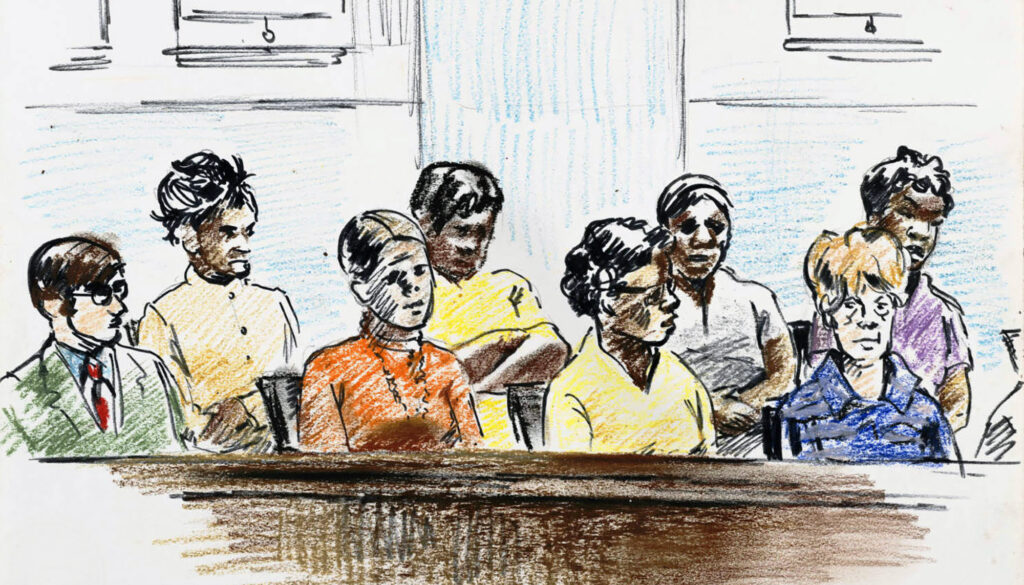
Robert Templeton via Wikimedia Commons
How do we keep local journalism and newspapers available? How do we fund those so that people are informed and not biased by large corporate money-influenced information? That gets in the way of “we the people.”
One important finding of our work is that people know more about federal candidates and understand the policy positions of federal candidates. But they feel like their vote matters less at the federal level. At the state and local level, they feel their vote matters more, but they know less about the candidates and less about their policy positions.
Are we not doing enough to get people to appreciate local and state politics? Governments can do more to help with that.
And so if you factor together a lack of information, a lack of understanding, a lack of trust —
Frankly, some elected officials enjoy eroding government’s value. They see that as the future, because then they can thrive and live the good life and protect their standing, and they can determine who else gets to live the good life.
If you don’t have an intervention for democracy — learning about it, having appropriate information, understanding other people, being empathetic and tolerant of difference, because that’s what a democracy requires — if you don’t have those things, there’s nothing to protect democracy.
We know there’s a lot of bad news about democracy, and in the report there’s a lot of data that are concerning. But what gives you hope for the future of democracy?
I think about it like this: Our research team got almost 2,500 respondents to answer three waves of data collection during a busy time period before and after the election. In the grand scheme of 330 million Americans, it’s not a lot, but it shows that some people are still willing to engage in public discussion and trust the organization that’s collecting the data.
We find very low support for political violence. People support learning programs about government and policy and civic education — not just for young people in school, but for the public in general.
I believe that the public is not trying to run from democracy. Their relationship to democracy is frayed, but they’re trying to get help. People still want to read information and data, they still want to learn about democracy, they’re intellectually curious about democracy and government and politics and different issues.
That’s good news — that’s hope.
This interview has been edited for clarity and length.